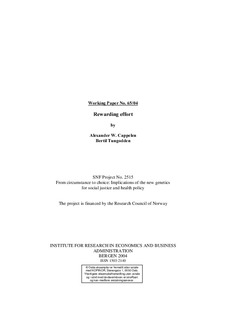| dc.description.abstract | According to liberal egalitarian ethics, individuals should be rewarded for factors under their control, but not for factors outside their control. A fundamental challenge to liberal egalitarian theories of justice is how to do this without violating minimal egalitarian and liberal requirements. The paper analyses the effects of two such requirements: the principle of equal reward and the principle of reward independence. The exact formulations of these principles depend on how we interpret the concept of reward. We propose two different definitions of reward, contrafactual and interpersonal reward, where both can be given a general and narrow interpretation. Given this, we show that it is impossible to establish a framework that is truly liberal egalitarian in all respects and that a generalized version of the egalitarian equivalent mechanism is the most plausible liberal egalitarian approach. | en |
